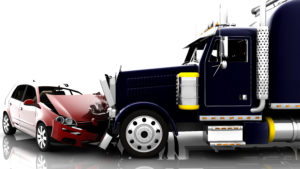Who Is Held Liable in a Truck Accident Claim?
“Who pays for my damages after a truck accident?”
This is a common question many may wonder about once they have been hurt in a collision with a tractor-trailer. Truck accidents can be very serious and result in major injuries. When injury victims see medical bills and other costs piling up while they miss work, they have a strong motivation to find the person or business who is responsible — or liable — for paying these costs.

In truth, every truck accident case is different. One of the most common scenarios is that the employer of the truck driver or the awarder of the contract for the shipment is held responsible. There are other scenarios, though, sometimes involving multiple liable parties sharing responsibility for damages.
Read on to learn more about the various possibilities for who could be held liable, but know that the best next step to take is to reach out to a Tampa truck accident lawyer. Hiring an attorney provides you with someone who can help you investigate your case and fight for the maximum amount of compensation available.
The Carrier Company Is Responsible for Employee Truck Drivers and Most Contract Truck Drivers
When you are involved in a car accident, you as the driver will likely take responsibility for any mistakes you have made. However, when someone is driving as part of their job, their employer assumes responsibility for the employee’s actions. Such is the case when a driver is technically at fault for a truck accident. The legal doctrine of “respondeat superior” — Latin for “let the superior answer” — means that employers are liable for damages caused by employees acting within the scope of employment.
In many cases, it is discovered that the employee’s own errors were part of an overall pattern of negligent hiring or poor oversight on the part of the employer. A fatigued driver, for example, may have been routinely expected to violate hours of service regulations to meet deadlines. A truck driver who causes an accident while under the influence may not have undergone a drug and alcohol screening as often as is required by federal law. A truck that broke down may have done so because the carrier neglected to make federally mandated inspections, or they failed to verify that the equipment owner has made these inspections.
Many truck drivers are independent contractors, which in some industries can mean that the driver must accept full liability for any damages they cause in the course of duties. However, in 1956 U.S. Congress amended the Interstate Common Carrier Act to require all contracting carriers to assume full responsibility for the equipment and any accidents caused during transport. Arguing that a driver was contracted is, therefore, rarely an effective defense, particularly when the shipment involved an interstate carrier operation.
The Owner-Operator May Be Liable in Some Cases
In rare cases where the carrier is not technically liable for the accident, the owner-operator of the truck is expected to carry a commercial bodily injury liability insurance policy. This policy is supposed to have much larger coverage limits than the typical non-commercial passenger vehicle.
One of the primary reasons that the carrier could not be held liable is that the owner-operator’s contract only involved local hauls or hauls completely within the state, potentially shielding the carrier from Interstate Common Carrier Act provisions. Even still, the terms of the contract are likely to state that the carrier shares liability in part or in full.
Any time a carrier tries to allege that the driver was an independent contractor, a Tampa truck accident lawyer will ask basic questions to reveal employee status. In the event that the driver was an independent contractor, though, the driver can still assume full liability or share liability for the accident’s damages with another party.
A Negligent Equipment Manufacturer or Maintenance Company
It is possible that neither the driver nor the employer is responsible for a catastrophic equipment failure that led to the accident. In these cases, the manufacturer of the equipment may assume the blame. Other times, a contracted maintenance company could be responsible because they failed to provide the expected service, which would have otherwise prevented the accident from occurring.
For many cases, a claim may be pursued against a third-party manufacturer or services provider while a separate claim against the carrier is underway.
Another Vehicle Involved in the Accident
Many truck accidents involve three or more cars, owing primarily to the massive size of the trucks themselves. Someone in a passenger car could have triggered the accident, causing the truck to collide with other vehicles through no fault of its own. Complex truck accident cases require a thorough investigation, which can include many different forensic elements.
When two or more parties are deemed responsible for a single accident, each will provide for their proportion of liability in the form of a settlement (or court-ordered award). If a sedan driver is 50% responsible and the truck carrier is 50% responsible, for instance, each will contribute half of the total damages.
Investigate Your Crash’s Causes With a Tampa Truck Accident Lawyer
The answer for “who is responsible for my truck accident damages?” depends entirely on the situation and the outcome of a thorough investigation. Proving who is liable can take considerable knowledge of the law, as well as a level of negotiation skill that comes from years of experience.
For all of these reasons, it can greatly benefit individuals involved in truck accidents to seek out the services of an experienced truck accident lawyer in Tampa. Darrigo & Diaz can provide you with an attorney to help you investigate your case, pursue all liable parties, and do everything possible to maximize your chances of obtaining the compensation you need.
You can learn more during a free, confidential, no-risk case evaluation when you call (813) 774-3341 or contact us online to schedule an appointment today.

